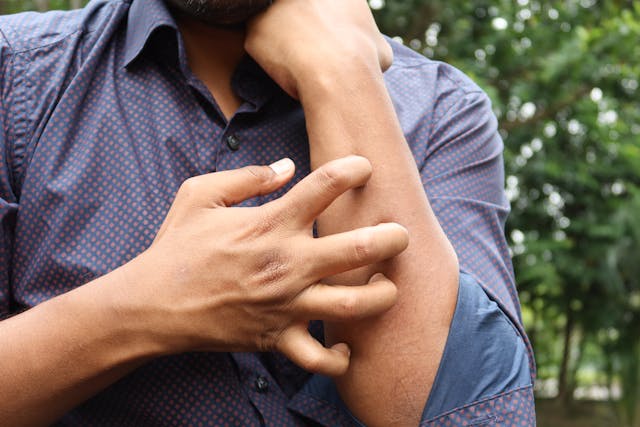Call Today to Schedule an Appointment: 212-319-5282
Are Food Allergies Contagious?
What Are Food Allergies?
A food allergy occurs when the body’s immune system mistakenly identifies certain foods as harmful. This overreaction can lead to a variety of symptoms, ranging from mild to severe. Unlike many other health conditions, food allergies can develop at any age, including adulthood. Food allergies are NOT contagious conditions, but an persons symptoms and reactions can affect people around them.

Are Food Allergies Contagious?
No, food allergies are not contagious in the traditional sense. Unlike infectious diseases that spread from person to person, food allergies are not caused by germs or viruses. They are a result of an overactive immune system reacting to specific foods. While it’s possible for someone to develop a food allergy after a blood transfusion or organ donation, this is a rare occurrence and does not involve direct person-to-person transmission.
How Do Food Allergies Work?
Normally, the immune system protects the body by identifying and attacking foreign substances. However, in individuals with food allergies, this response becomes hyperactive, triggering allergic reactions to specific foods. These reactions can be mediated by IgE antibodies or non-IgE mechanisms.
Common Food Allergies
IgE-mediated allergies
These are often diagnosed in children and infants and are commonly caused by milk, eggs, and wheat. Symptoms can affect the skin, gut, eyes, and mouth.
Non-IgE-mediated allergies
These can also cause allergic reactions but do not involve IgE antibodies.
Symptoms of Food Allergies
- Abdominal pain, diarrhea, and nausea
- Edema, erythema on the skin, and hives
- Swelling of the lips and throat
- Fatigue, dizziness, and bloody sputum
Transmission of Food Allergies
While food allergies are not contagious in the traditional sense, they can sometimes be transmitted through blood transfusions or organ donations. However, the risk of this happening is low, and the transmitted allergic reactions often subside over time.
Liver Transplantation and Food Allergies
Individuals who undergo liver transplantation may develop food allergies, especially children. These allergies are more common in the early stages of transplantation but tend to decrease in severity over time.
Allergic Proctocolitis
Allergic proctocolitis is a condition that primarily affects infants and can be caused by breastfeeding. Symptoms include watery, mucus-filled stool, blood-streaked stool, fussiness, and anemia. Mothers can often help alleviate these symptoms by avoiding certain foods in their diet.
Preventing Food Allergies
While it’s not always possible to prevent food allergies, certain measures can be taken to reduce the risk, especially in infants and young children. Breastfeeding, introducing new foods gradually, and consulting with a healthcare professional can be helpful.
If you suspect you or someone you know has a food allergy, it’s important to consult with a healthcare professional or experienced allergist for diagnosis and management.
Allergy, Asthma and Sinusitis P.C
Boyan Hadjiev, MD
30 East 40th Street
Suite 1200
New York, NY 10016
212-319-5282
Call our offices at 212-319-5282 to schedule an appointment with the best allergist in New York City.
Serving all of New York City and the Tri State Area including Zip Codes: Top Allergist NYC Midtown, Chelsea and Clinton: 10001, 10011, 10018, 10019, 10020, 10036 | Gramercy Park and Murray Hill: 10010, 10016, 10017, 10022 | Greenwich Village and Soho: 10012, 10013, 10014 | Lower Manhattan: 10004, 10005, 10006, 10007, 10038, 10280 | Lower East Side: 10002, 10003, 10009 | Upper East Side: 10021, 10028, 10044, 10128 | Upper West Side: 10023, 10024, 10025
